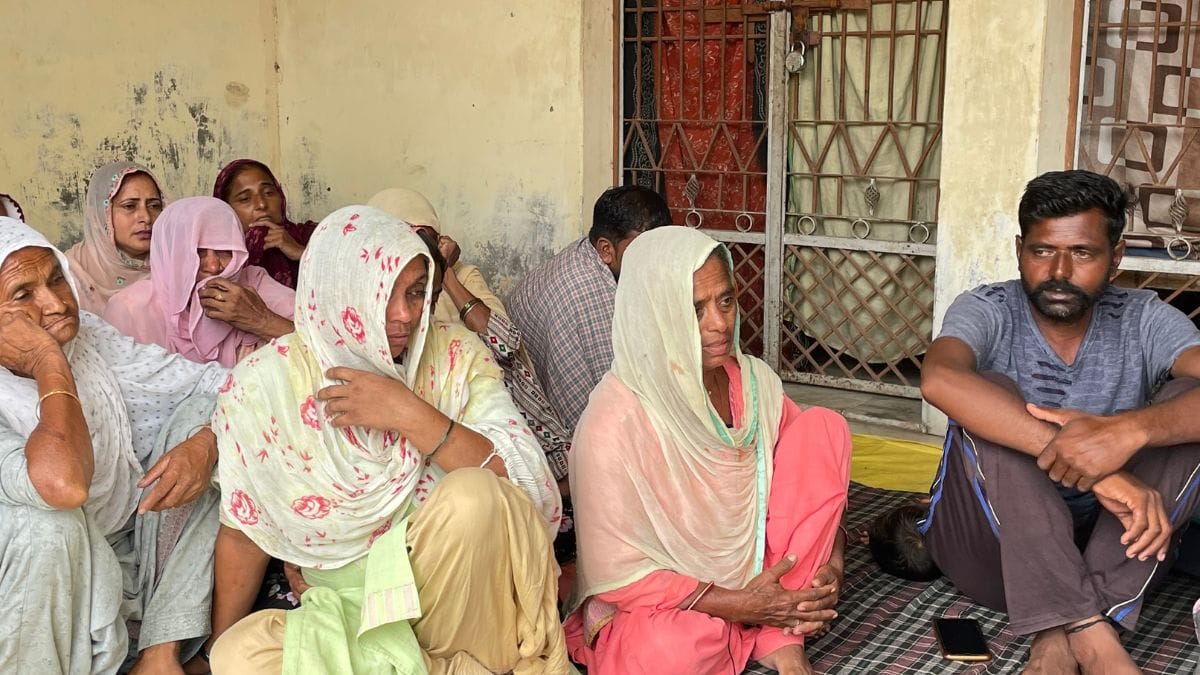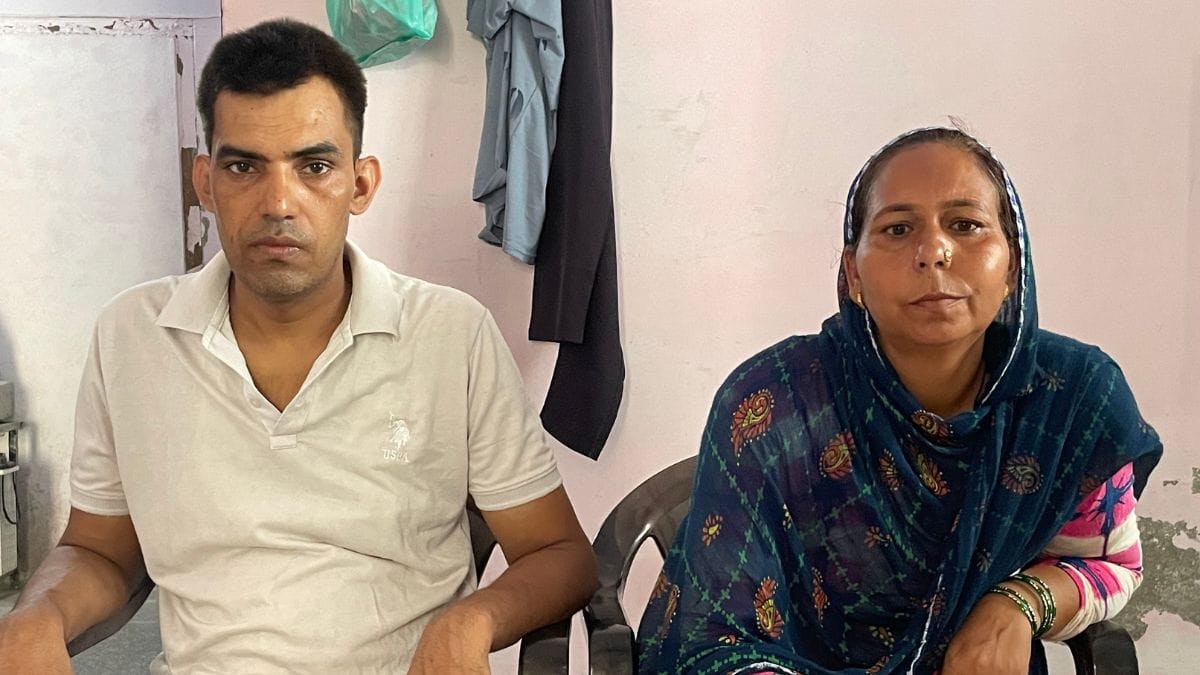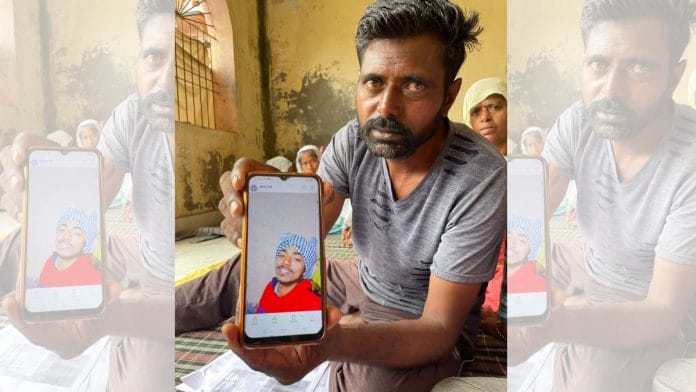Sandeep Kumar and his 21-year-old nephew Tony left for Italy in February with dreams of fancy jobs, lots of money and a new life under the Tuscan sun. After a harrowing six months that took them to Dubai, then Benghazi, Zuwarah and finally to Tripoli in Libya, Kumar returned to his village in Punjab on 20 August. And then the family told him that Tony had died. Now, every day, the family goes to the Krishna mandir near their house in Bhukhri village, praying for the body to be returned.
“Come back to us Tony,” wails his grandmother sitting on one of the many mattresses that have been laid out in the temple courtyard. They don’t know how he died. The agent who organised the paperwork for their new life claimed it was suicide. The agent is in jail. And nobody has answers.
Sandeep and Tony Kumar were among the 18 men who tried to flee joblessness and bleak prospects in their villages and small towns strewn across Haryana and Punjab. But they never made it to Italy. Instead, they were sent to Libya by the unscrupulous agent, where they were sold into slavery. They were stripped of their documents, separated, blindfolded and sold to their ‘masters’ in Libya. They were tortured, starved and forced into construction work for months on end. Even after they were rescued, they spent three months in a jail in Tripoli, Libya before they could get new passports.
Victims of the Great European dream, most of the men come from lower middle class and poor families desperate to believe agents peddling hope through the illegal ‘donkey’ route to foreign countries. The perils of human trafficking is a small price to pay for the prestige of a permanent residency in another country. Those who make it are idolised. The money they send back to their families is displayed through fancy houses, flat screen TVs and iPhones.
Tony’s father, Ravinder Kumar’s eyes are bloodshot from tears and sleepless nights. His son was able to call him from a phone one of the men in captivity had managed to hide from their ‘master’.
“Tony was crying. He was breathless. He said papa they are torturing me. They beat me up every day. Please, do something. I want to come back. I will never even think of leaving India now,” said 43-year-old Ravinder. His son told him that the phone belonged to a Pakistani man who too was trapped with him.
A group of villagers gather around him, sipping tea and interjecting with a long solemn cry of “Waheguru”.
Ravinder swipes through the image folder on his phone, and pulls out a photo Tony had sent him from that secret phone. A young man wearing a black turban and shirt stands against a wall. He is pale, but manages a weak smile for his father.

Also read: Raj Bhavans aren’t just about pomp, privilege but power too. They are now BJP war rooms
The hope, the dream
It began with a passport, a ticket and a visa to Dubai followed by a party.
The Kumars, their extended family and close friends cut a two-tiered vanilla cake on 5 February, a day before Tony and his uncle were scheduled to leave for Dubai and then Italy. “I thought Tony and I would earn huge sums in Italy by driving cars and trucks and send money back home every month. That day, it felt that poverty was far behind us,” says Sandeep.
Their agent—whom they each paid Rs 12 lakh to—accompanied the family to Amritsar airport. There Sandeep met four men from Haryana who were also Madan’s clients on their way to Italy.
Ravinder Kumar has a video of the men flashing their passports as they enter Amritsar airport. There’s another video of Tony and the others on the plane flashing a ‘V’ for victory sign and grinning from ear to ear. In a week, they would be in Libya, trapped and alone.
The agent assured them that they would get their visa to Italy in Dubai. For five days, the men waited in a dormitory in Dubai suspecting nothing. And then Madan called them. They would be going to Libya instead.
“He told us that we would have to work in Libya for a few months before we could reach Italy. We didn’t question him,” says Sandeep.
When the men landed at Benghazi airport, they were reportedly hustled outside from a side gate.
“We were never taken to the main exit of the airport. An agent came, took our passports under the pretext of giving us a work permit, and asked us to follow him through the back-door exit. We were made to sit in a car, our eyes covered with a black cloth. Our arms were tied to the back.” Sandeep’s recollections are punctuated by long pauses and bouts of coughing. He can barely walk after spending months working on a construction site in Benghazi.
They were trussed up in the car for three days. “We only stopped thrice for water,” he recalls.
The men were taken to Zuwarah in Libya where Sandeep claims they were sold to buyers armed with AK-47 guns. He calls them the “mafia”. That’s when he was separated from Tony. Their phones were taken away and they were kept in a small dark room.
Four men from Haryana and Punjab who were rescued along with Sandeep had similar stories. Forty-year-old Paramjeet Singh from Kurushetra in Haryana was another of Madan’s clients. He left Delhi airport on 25 March, stopped at Dubai like the Kumars and within a week, his dreams descended into a nightmare.
“They would beat us with a plastic pipe. With us were men from Pakistan, Nigeria, Ethiopia who were given the same treatment,” said Singh.
They were made to work on construction sites for 12-14 hours a day. They were not given food for days, and had to drink water from toilets.
“We would squeeze our T-shirts wet from the sweat of labour and drink the salty-sweaty-water to quench our thirst,” said Sandeep. He bitterly regrets the day he met Madan Lal who happens to be a family friend of sorts.
“He was from our community, a Dalit like us. We trusted him completely.”

Also read: Christianity, polygamy, tribal insecurities — Meghalaya has a high fertility problem
The travel agent, a family friend
Every year, thousands of men from Punjab and Haryana take the donkey route abroad. Canada and Australia are preferred destinations but it costs at least Rs 30-35 lakh per person. Italy is the budget option, and Madan Lal is the go-to agent.
He is a cog in a well-oiled multinational business of human trafficking, and specialises in sending people to Italy, though most of his clients allegedly land up as labourers in Libya.
“We suspect that he has duped as many as 500 people from Punjab and Haryana and sent them to Libya in the last two years,” said a senior police officer from Kurukshetra involved with the case where Madan Lal has a travel agency, CBR Travels.
Agents like Madan Lal are a dime a dozen in Haryana. Immigration in Haryana alone is estimated to be an annual business of Rs 1,500 crore. To clamp down on immigration fraud, the government formed a Special Investigation Team (SIT) in April. In one month, it made 23 arrests and registered 138 FIRs.
In May, the SIT proposed that immigration agents submit a bank guarantee of Rs 25 lakh to their respective district superintendent of police (SP). In the case of a fraud, the money will be used to compensate the family. It would also help police keep track of agents.
On the internet, CBR Travels is shown to be established in 2007 promising work and tourist visas. It’s a dingy one room set up which is now locked. The police have seized the signboard which had ‘CBR Travels’ written on it and an Air India plane taking off in the backdrop of the Eiffel Tower.
Madan Lal was arrested last month and booked under sections 406, 420, 120-B of IPC, from his house in Pooja Colony of Pehowa and is in Kurukshetra jail awaiting trial.
“He has duped hundreds of young men from Haryana and Punjab. He is under investigation,” says SHO Pehowa Kuldeep Singh.
His agency is unregistered and it was mostly Madan Lal’s men who would handle aspirants with dreams to go aboard. “In cases where the visa was finalised, Madan Lal would come to the office and speak to the families,” says a local police officer involved in the case said.
Ravinder Kumar and his brother Sandeep and six other villagers had gone to meet Madan Lal in a Swift car they hired last year in December.
“He asked us for Rs 12 lakh per person, assuring that my son and brother would be given a job in Italy and they will be able to send a lakh or two back home every month,” Kumar says, holding his head in despair.
Kumar had to arrange Rs 24 lakh to send his brother and son to Italy. He sold off his half acre land that got him Rs 13 lakh and took loans from relatives and villagers with a promise to pay them back as soon as his brother and son start earning.
After Kumar received the call from Tony, he realised the foreign dream was turning into a nightmare. But whenever he approached Madan Lal, the agent would demand more money to free him. This was his modus operandi.
Paramjeet Singh’s family sent the agent more money. Singh’s wife Rajini mortgaged their house and sold all her gold to get another Rs 15 lakh, but it wasn’t enough.
“I would meet Madan Lal and give him money but he wouldn’t stop asking for more. He would threaten us with dire consequences. We have nothing left here,” says Rajini sitting next to her husband on a cot in a rented room.
The police are aware of the Libya-Punjab-Haryana human trafficking nexus and Madan Lal’s alleged role in it. Even before Kumar, Singh and the others returned to India, they had started investigating after twelve men were rescued and brought back on 31 July.
“The dream of working in a western country has traveled from Punjab to Haryana with unscrupulous, unregistered agents popping up in the districts of Kurukshetra, Ambala and Sirsa among others,” says the senior police official quoted above.
In Punjab, the government runs special drives to crack down on fly-by-night agents. In its latest drive in August, a team of districts SDM under NRI Affairs Minister Kuldeep Singh Dhaliwal ran a check on 3,547 agencies, of which 271 were found illegal.
“These agents don’t take licenses on their names. Many of them work from homes and cars. They don’t even need an office. They will give ads on Facebook and other social media accounts. They trap uneducated, poor people who are not literate by selling dreams of foreign land. These agents keep mediators in the villages for some money and that’s how this dark underbelly works,” says Jatinder Benipal, president of Association of Licensed Immigration and Education Consultants.
Also read: In Shimla relief camp, landslide victims count their losses. Homes gone, schoolbooks washed away
The rescue
On 1 July, Ravinder Kumar received a call from Madan Lal saying that he would meet him in Bhukhuri village near his house in the evening. Kumar suspected something ominous and called his sarpanch. A panchayat was held. When Madan Lal reached the village, he shared the news of Tony’s demise.
Infuriated, Kumar and other villagers roughed up Madan Lal, but he kept apologizing, saying their son had committed suicide by jumping off the third floor. Kumar doesn’t believe that.
“My son was taller than me. He was a strong man. Why would he commit suicide? I knew Madan Lal was hiding something,” Kumar says.
That evening, Kumar tried to call his brother, Sandeep, who also had access to a hidden phone, but was unable to reach him. His desperation grew and he finally filed a complaint at Handesra police station.
The family also contacted AAP Rajya Sabha MP Vikramjeet Singh Sahney and gave him the contact of the Pakistani man whose phone was used to get in touch with them.
“We spoke to the Pakistani man who said that Tony had died after jumping off the third floor to escape mafias torture. He had died on the spot due to injury on his head and his body is in Benghazi from where we are trying to get it back,” AAP MP Vikramjeet Singh told ThePrint.
It so happened that the MP had been contacted by another man, who they later realised was someone from Sandeep’s group of captives. On 27 May, Singh received a call from a man named Rahul Sharma, saying they were being beaten and forced to work in Libya. To establish, it was not a fake, the MP video called him and spoke to other trapped men who were living in horrible conditions.
There is no Indian embassy in Libya. “I wrote to the Indian embassy in Tunisia giving details of the men trapped in Libya and that’s how the process of return started,” says Singh.
“Rahul Sharma was the only man who could speak English. He would send us Google locations that we would pass on to the Indian embassy in Tunisia,” says the MP.
They identified a safe hotel at an unidentified location in Libya where the men could stay before returning to India. But the road to reach the hotel was a hard one. Every night, a few men with the help of informers would scale down from a small window in their barrack and make the dangerous trek to the hotel.
The Libyan police intervened, but also arrested the men because none of them had passports.
“There is no law and order in Libya. We, with the help of their families in India, arranged for a White Passport and sent it to the Indian embassy in Tunisia,” says Sahney.
The men spent three months in a jail in Tripoli where they were kept in a small room with 15 other inmates. In the jail, Rahul Sharma would call us from a phone of a Nigerian man and that’s how we kept the embassy updated,” says Sahney.
Once the passport was made, they left Libya via Turkey and Bahrain and reached India.
“I couldn’t believe that we had left Libya. I kept slapping and pricking myself in the airplane. I was scared. Are they taking us somewhere else? I kept asking other men in the airport,” says 31-year-old Rahul Kumar from Kurukshetra’s Pehowa who was also trapped in Libya.
Also read: Jobless Haryana men have a new mission in Muslim hate. ‘They think cow protection is govt job’
A lifetime of trauma
Rahul Kumar is back home with his wife and children and his sister and brother-in-law in Kurukshetra’s Pehowa town, but his mind is trapped in Libya. He roams around his sister’s house in a daze, unable to sleep at night or relax during the day.
His three daughters — all under 10 years — follow him wherever he goes. They hadn’t seen their father in seven long months.
Rahul Kumar knew Tony and Sandeep. He was among the men they had met at Amritsar airport in February. In the video they took on the airplane—the one Tony’s father has on his phone—he’s sitting right next to Sandeep.
“I wanted to earn for my daughters. For their better future. So they could go to good schools,” Rahul said.
The siblings lost their parents years ago, and 28-year-old Sonia (Rahul’s sister) has taken on the role of the older sister taking care of him. Kumar’s wife refused to talk to the media, and weeps silently when Rahul talks about his experience.
In the middle of his recollection, Kumar becomes breathless. He pinches himself and cries loudly.
“It was horrific. I never thought I would return,” Kumar says, wiping his tears. The local physician, who visits him every day, insists that physically he is healed, though he is still underweight.
“He was 95 kg when he left. Now he is 60 kg,” said Sonia as she insists that Rahul eat another chappati. But every time he eats more than two chappatis, he throws up.
Several times a day, Rahul repeats his ordeal in Libya. His family members listen to him quietly, knowing that it will take him time to recover from the trauma.
“They would serve us bread in the confinement of the buyers. And in the jail, we were given macaroni on a plate that ten people had to share. How can a person eat macaroni every day?”
Rahul claimed that he and the others were asked to recite the Islamic religious prayer by the men who bought them. In the room they were stocked, there was a small window from where they could watch the sea.
“But we would hear stories of how trapped men were killed and dumped in the sea on account of not following the orders. The Libis would speak in Arabic. They had a Pakistani man with them who would narrate in Hindi. He would not even spare fellow Pakistanis trapped with us,” Rahul recalls.
The family physician wants Rahul to undergo therapy, and Sonia has booked an appointment with a psychiatrist. He’s eager to start the healing process.
“My ears are ringing again. My heart is racing. Give me some water. I can’t breathe,” says Rahul, tapping his forehead with his fingers.
(Edited by Anurag Chaubey)






